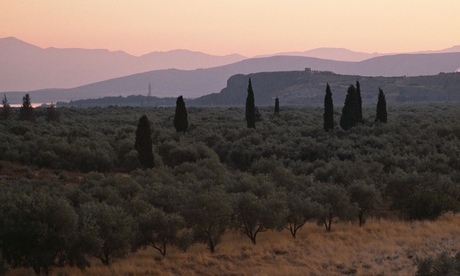
At the end of Sebastian Barker's final collection, in A Monastery of Light, he writes about the south-west Peloponnese where, he explains in a footnote, "inspired by the modern Greek poets", he bought a ruined house in 1983 for £780 and lovingly restored it "according to the old traditions". "For man to be born and to live, in such a place as this, is indeed/ miraculous./ This becomes more obvious the closer you are to death."
These poems were written in the shadow of death – Barker died on 31 January of this year – but are filled with the light of being alive, and often with Grecian sun. What makes them unusual is their open-hearted, open-handed Christian faith, their affirmation, the sense of coming closer to God. Barker, son of the poet George Barker and the author Elizabeth Smart, who wrote By Grand Central Station I Sat Down and Wept), was the distinguished author of 14 volumes of poetry. He converted to Catholicism in middle age. Even without sharing his faith, one feels uplifted by his vision, his poems a holiday for the soul. There is nothing stuffily reverential here. In the last poem, The Sea Seen From Sitochori, he refers, with charming, comic off-handedness, to the probability that his late mother may be haunting the place: "She'll be around somewhere, in a prospect rich as this."
How – and what – he sees is more important than how he writes. His poems tend to be as traditional as his Greek house. He is a great composer of songs, although at times his rhymes are too conspicuous for my taste – neatly chiming or dragging their heels. But this scarcely matters because, in his case, content renders form inconsequential. Not that I mean to imply the writing is slipshod. On the contrary, as The Critical Faculty of the Poet – devoted to the treacherous, intricate, necessary art of revision – makes plain, one has to guard against "improving what was previously better".
There are many moments of shared delight: Barker has a gift for making you feel you are with him. A Cocktail on Cos is a poet's postcard from abroad. It is languid yet observant. One can imagine him writing on the back of a napkin: looking at strolling couples and hearing the "unkillable" bouzouki. He writes: "…The nearby concrete mixer/ Is empty and pointed at the sky./ And a gliding sparrow swoops low over a rooftop./ Come, I said, do not be shy. Take a glass of ouzo./ The day has been a long one. Nor may the night be predictable."
If he is talking about his own death, it is only as part of the convivial moment with the sparrow. The lightness of touch makes it all the more moving.
There are two devotional poems about The Land of Gold – the collection's title. The first, inspired by south-west France, merges real and imagined landscapes; the second, The Land of Gold Returns, is the more powerful because spare. Nothing is surplus to requirements as he describes an inner landscape that is an article of faith. Having said that, I am glad of the survival of "dainty" because of its incongruous particularity alongside the Blakean language accompanying it. And his conclusion that poetry and paradise go together is refreshing to read in this century.
There is in this poem a quality that defines Barker, of steadiness as well as vision. He will not tip over – he is self-stabilising. And if there is a touch of Emily Dickinson in The Land of Gold Returns, he will, unlike her, never be fey – even with heaven in his sights.

